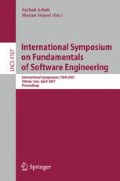Abstract
Since usually no scheduler is given at the programming or modeling language level, abstract models together with a refinement notion are necessary to model concurrent systems adequately. Deterministic transition systems are an appropriate model for implementations of (concurrent) reactive programs based on synchronous communication. In this paper, we develop a suitable setting for modeling and reasoning about deterministic transition systems. In particular, we (i) develop a class of abstract models together with a refinement notion; (ii) define parallel composition guaranteeing fairness; and (iii) develop a 3-valued logic with a satisfaction relation that is preserved under refinement.
Access this chapter
Tax calculation will be finalised at checkout
Purchases are for personal use only
Preview
Unable to display preview. Download preview PDF.
References
Object Management Group: UML Superstructure Specification, v2.0 formal/05-07-04 (2005)
Manna, Z., Pnueli, A.: The Temporal Logic of Reactive and Concurrent Systems. Springer, New York (1992)
Park, D.: Concurrency and automata on infinite sequences. In: Deussen, P. (ed.) Theoretical Computer Science. LNCS, vol. 104, pp. 167–183. Springer, Heidelberg (1981)
Lynch, N., Vaandrager, F.: Forward and backward simulations: I. Untimed systems. Information and Computation 121, 214–233 (1995)
Alur, R., Henzinger, T., Kupferman, O., Vardi, M.Y.: Alternating refinement relations. In: Sangiorgi, D., de Simone, R. (eds.) CONCUR 1998. LNCS, vol. 1466, pp. 163–178. Springer, Heidelberg (1998)
Bloom, B., Istrail, S., Meyer, A.: Bisimulation can’t be traced. J. ACM 42(1), 232–268 (1995)
Walker, D.J.: Bisimulation and divergence. Information and Computation 85(2), 202–241 (1990)
Milner, R.: A modal characterization of observable machine-behaviour. In: Astesiano, E., Böhm, C. (eds.) CAAP 1981. LNCS, vol. 112, pp. 25–34. Springer, Heidelberg (1981)
Glabbeek, R.v.: The linear time–branching time spectrum I. The semantics of concrete, sequential processes [31], pp. 3–99
Clarke, E.M., Emerson, E.A.: Design and synthesis of synchronization skeletons using branching-time temporal logic. In: Kozen, D. (ed.) Logics of Programs. LNCS, vol. 131, pp. 52–71. Springer, Heidelberg (1982)
Kozen, D.: Results on the propositional μ-calculus. Theor. Comput. Sci. 27, 333–354 (1983)
Janin, D., Walukiewicz, I.: Automata for the modal mu-calculus and related results. In: Hájek, P., Wiedermann, J. (eds.) MFCS 1995. LNCS, vol. 969, pp. 552–562. Springer, Heidelberg (1995)
Larsen, K.G., Thomsen, B.: A modal process logic. In: LICS, pp. 203–210. IEEE Computer Society Press, Los Alamitos (1988)
Larsen, K.G., Xinxin, L.: Equation solving using modal transition systems. In: LICS, pp. 108–117. IEEE Computer Society Press, Los Alamitos (1990)
Fecher, H., Huth, M.: Ranked predicate abstraction for branching time: Complete, incremental, and precise. In: Graf, S., Zhang, W. (eds.) ATVA 2006. LNCS, vol. 4218, pp. 322–336. Springer, Heidelberg (2006)
Shoham, S., Grumberg, O.: 3-valued abstraction: More precision at less cost. In: LICS, pp. 399–410. IEEE Computer Society Press, Los Alamitos (2006)
Dams, D., Namjoshi, K.S.: The existence of finite abstractions for branching time model checking. In: LICS, pp. 335–344. IEEE Computer Society Press, Los Alamitos (2004)
Dams, D., Namjoshi, K.S.: Automata as abstractions [32], pp. 216–232
Huth, M.: Refinement is complete for implementations. Formal Asp. Comput. 17(2), 113–137 (2005)
Grumberg, O., Lange, M., Leucker, M., Shoham, S.: Don’t know in the μ-calculus [32], pp. 233–249
de Alfaro, L., Godefroid, P., Jagadeesan, R.: Three-valued abstractions of games: Uncertainty, but with precision. In: LICS, pp. 170–179. IEEE Computer Society Press, Los Alamitos (2004)
Henzinger, T.A., Majumdar, R.: Fair bisimulation. In: Schwartzbach, M.I., Graf, S. (eds.) ETAPS 2000 and TACAS 2000. LNCS, vol. 1785, pp. 299–314. Springer, Heidelberg (2000)
Graf, S., Saidi, H.: Construction of abstract state graphs with PVS. In: Grumberg, O. (ed.) CAV 1997. LNCS, vol. 1254, pp. 72–83. Springer, Heidelberg (1997)
Hoare, C.A.R.: Communications Sequential Processes. International Series in Computer Science. Prentice Hall (1985)
Milner, R.: Communication and Concurrency. International Series in Computer Science. Prentice-Hall, Englewood Cliffs (1989)
Wilke, Th.: Alternating tree automata, parity games, and modal μ-calculus. Bull. Soc. Math. Belg. 8(2), 359–391 (2001)
Sistla, A.P., Clarke, E.M.: The complexity of propositional linear temporal logics. Journal of the ACM 32(3), 733–749 (1985)
Bergstra, J.A., Fokkink, W., Ponse, A.: Process algebra with recursive operations [31], pp. 333–389
Fecher, H., Majster-Cederbaum, M.: Event structures for arbitrary disruption. Fundamenta Informaticae 68(1,2), 103–130 (2005)
Lynch, N., Tuttle, M.: An introduction to input/output automata. CWI-Quarterly 2(3), 219–246 (1989)
Bergstra, J.A., Ponse, A., Smolka, S.A. (eds.): Handbook of Process Algebra. North-Holland, Amsterdam (2001)
Cousot, R. (ed.): VMCAI 2005. LNCS, vol. 3385, pp. 17–19. Springer, Heidelberg (2005)
Author information
Authors and Affiliations
Editor information
Rights and permissions
Copyright information
© 2007 Springer-Verlag Berlin Heidelberg
About this paper
Cite this paper
Fecher, H., Grabe, I. (2007). Finite Abstract Models for Deterministic Transition Systems: Fair Parallel Composition and Refinement-Preserving Logic. In: Arbab, F., Sirjani, M. (eds) International Symposium on Fundamentals of Software Engineering. FSEN 2007. Lecture Notes in Computer Science, vol 4767. Springer, Berlin, Heidelberg. https://doi.org/10.1007/978-3-540-75698-9_1
Download citation
DOI: https://doi.org/10.1007/978-3-540-75698-9_1
Publisher Name: Springer, Berlin, Heidelberg
Print ISBN: 978-3-540-75697-2
Online ISBN: 978-3-540-75698-9
eBook Packages: Computer ScienceComputer Science (R0)

